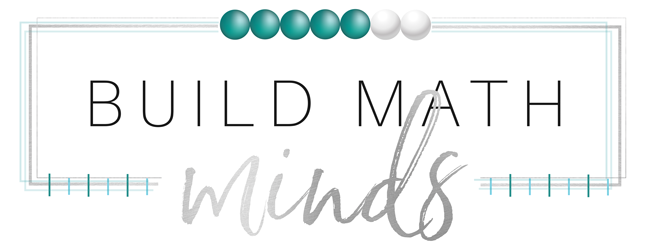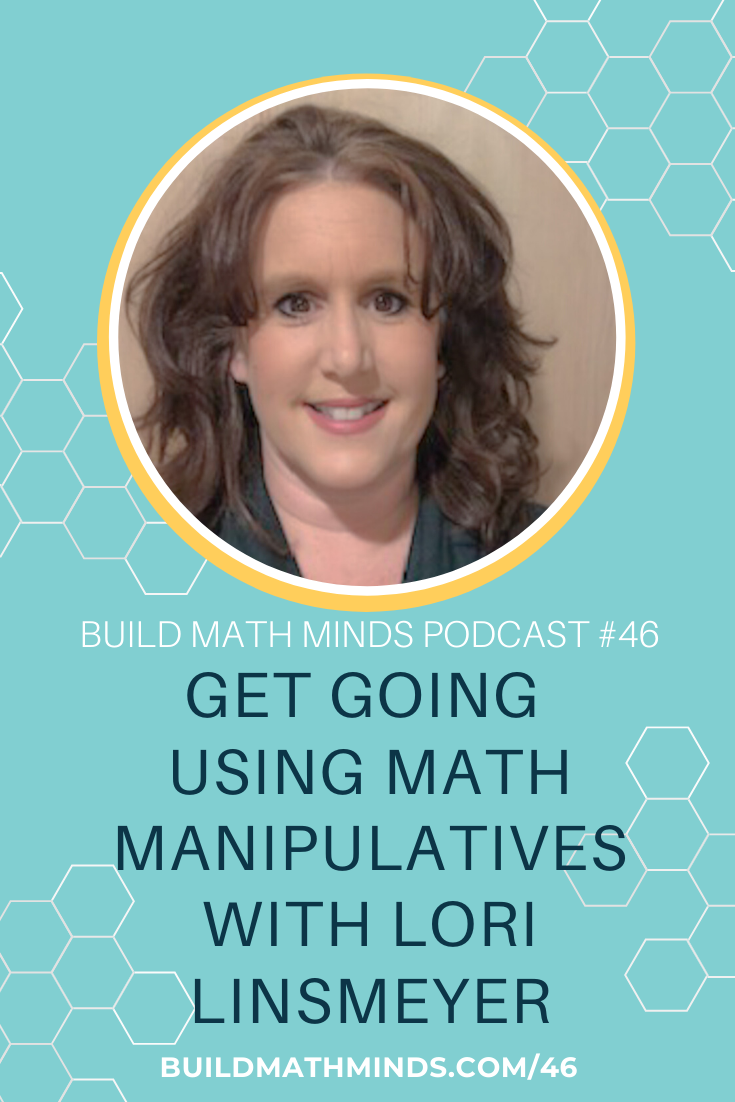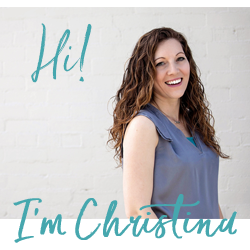Resources mentioned in this episode:
Link to Must Have Manipulatives vlog post
Welcome fellow Recovering Traditionalist to episode 46. Today we are getting Information and Inspiration from Lori Linsmeyerr who encourages us to Get Going Using Math Manipulatives.
Christina: Now before we jump into this interview, I just want to remind you that all of the links to things that we talk about in this interview can be found over at the show notes page. And Lori talks about some great ones. All right, here’s our interview.
Christina: All right, so in this podcast episode, I am so thankful to welcome Lori Linsmeyer. And Lori, I just want to start off with tell everybody what your role is in school and kind of where you started and where you’re at now.
Lori : Okay. Hi Christina. Thanks for having me. I have been a math teacher, or I should say an elementary teacher for 29 years. The last 3 years I moved myself out of the classroom and became a math interventionist for kindergarten through grade 5 students. Now my focus is primarily at the kindergarten through grade 3. And my position as a math interventionist is now kind of evolving into a math coach position as well. So it’s been a lot of fun because I get to be a little bit of everything. I get to push into a classroom. I get to pull kids out for some smaller group interventions. And I get to also work with my colleagues in a fun, exciting way of trying to promote math.
Christina: Yeah. Isn’t it fun that as we learn more, it is cool to be able to share that information with the colleagues, which oftentimes we don’t get the opportunity to do as a classroom teacher. There’s just not those opportunities a lot of times.
Lori : Right. And there’s not a lot of opportunity to develop that excitement for math it seems. So this has just been an awesome opportunity. So it’s a great position to be in and it can be very impacting not only for students but also for colleagues and school districts.
Christina: Yeah. So tell me a little bit about professional development that has helped you along the way. So I know you’ve done some stuff through us so you can talk about that, but any other professional development that you’ve been a part of? Just anything that kind of strikes you of, “These things made a difference, that when I learned this, it helped my instruction.”
Lori : Actually I’ve always enjoyed math and for many years as I taught, I thought I was teaching math very well. And I thought it was the right or should I say the most effective way of teaching math. And as I became more involved with professional reading and professional development on the topics of math, I really realized how much I didn’t know and how much I could change my instruction to just really develop that conceptual understanding of math. That has been very huge for me. I would have to say that the development and the knowledge of number sense and how do you develop that with students has been just a huge impact for me as an educator and also for the students that I work with.
Christina: So when you were talking about that, you started to say the right way of teaching and you changed it to effective teaching. You thought you were doing effective teaching. So before you started learning more, what was the teaching of math like?
Lori : Honestly, Christina, I think it just goes back to how I remember learning math. There were not a lot of opportunities in my college training of the best ways to, or the most effective ways of teaching math. We had maybe one or two method classes. So I relied heavily on how I learned math going through school. And I use that as probably my most … the way that I kind of went back to teaching math. And since then, with learning all the different ways and especially even little things like you get the manipulatives often with a program that you have, but how do you use those correctly and which tools should you use? I mean there’s just so many more things that I have learned since participating in the professional developments that you have given us that opportunity to have.
Christina: Ah. so because we kind of all … We’re in different generations of when we went to school, well and I don’t know that it was really generational of what the teaching and learning of mathematics was like. But more dependent I guess upon the teacher you had is more of what made a difference. So what was the learning of math like for you? What did you think math should be like?
Lori : Math for me was very procedural. It was a lot of memorizing steps and I was good at that so I could learn my multiplication facts and my division facts and adding and subtracting. So I enjoyed that part. But boy, when I got into the higher levels of math, I didn’t really understand what was going on. And I just wish that I would have been had the opportunity to learn math in a more concrete way where you had an opportunity to explore and play and then take that to find that understanding of what that means when you look at math from more of an abstract way. I was abstract from day one.
Christina: I kind of laughed when you’re telling your story because it’s so similar to my own. I was so good at following rules and procedures. And that’s the way I taught math until I’ve learned a different way.
Lori : Right.
Christina: So, what are a few things that you feel like you’ve changed the most in your teaching from being very procedural and rule driven, now what is the teaching of mathematics supposed to be like to you?
Lori : Well, a big one that comes to mind, not only with really focusing on giving kids the opportunity to explore through manipulatives, but more than that, I’ve also found that there’s not just one way to learn math or to teach math, that if we allow kids to explore and come up with a variety of different ways to solve math problems, those aha moments really show up a lot. And what’s interesting is it really puts kids all on the same playing field when they walk into a classroom because they’re more eager to take risks because they know that it’s okay to make mistakes. And we work together and we find those changes and then we agree on what makes sense. So yeah, it’s just amazing to me that when kids can see things using manipulatives, it makes sense. And once kids can make sense and have time to develop that understanding, then going to a higher level math is going to be so much easier because that number sense in that foundation is there.
Christina: Yeah. We often think that doing that concrete stuff tends to slow us down. But from what you were talking about, it just makes the other stuff so much easier when you get there.
Lori : Right. And I remember as a teacher as well that you’d almost want to cringe bringing out the manipulatives because it was kids wanting to play instead of staying focused. But boy, when those kids have the manipulatives in their hands, that play goes away because they start seeing them as tools and they use them effectively. And that whole worry of management within the classroom all goes away. It does, it just falls into place. And kids get excited about math. They call it play math. “Do we get to play math again today?” And it’s so fun to see how excited they get about the topics that used to be once dreaded by many students.
Christina: Yeah. That’s awesome. All right, one of the questions that I had down to ask is if you had a specific story about how the change in your teaching has impacted the change in student learning.
Lori : We have really focused hard on number sense in our school. And matter of fact, the math racks or the Rekenreks that I’ve learned through following you has been an amazing eye-opening experience. I cannot say enough about how that tool has just really developed the number sense in our kindergarten and first graders. Our students are moving up the chain. We’ve been working with these tools now for, it’ll be going on three years next year and now we’re really starting to see, because they’re getting into 3rd grade and they’re getting into 2nd grade. And teachers are able to do what is expected at their grade level now, instead of having to feel like they have to go backwards because kids are not coming in with what they need. They are coming in with what they need
Lori : It’s just fun to hear and see how kids are manipulating numbers, how the connection of learning how to decompose numbers in kindergarten, and they’re using that same skill and they’re looking at multiplication off of the skills they learn from decomposing in 1st grade and kindergarten. And it just, it all just flows together so nicely and they develop and they talk math and the discourse that goes on in the classrooms is just so exciting to be a part of. And whenever we do have those number talks and we do have the math talks, it’s just fun because kids are coming up with views and ideas and strategies that we as teachers would not even see ourself.
Christina: Yeah, isn’t that amazing.
Lori : It’s really cool.
Christina: Yeah. So I just have to say, this will probably be posted, it’s later than when we’re actually doing the interview. But just right before this, not even 10 minutes, I was kind of scrolling on Instagram and I saw a post by someone and it was a Rekenrek and it was with fractions. And I was like, it intrigued me because I’ve never done fractions on a Rekenrek, but the caption underneath it was talking about how this teacher had let the students just play with all the manipulatives and just asked the kids to talk about what they thought, what they find, what they saw, what they see in these manipulatives.
Christina: And I was like so blown away because I have worked with Rekenreks for a lot of years now and I have ever seen fractions within it. And it just proved to me that how much we as adults, we think we see the mathematics, but when we can let the kids explore, they see so much more than we ever could.
Lori : Right. Oh boy, that does sound fascinating, as fractions. But you’re right. Matter of fact, we’ve had huge amount of snow and bad weather this winter. I mean, we’ve been pummeled with it. So we’ve had a lot of inside recess. Christina, kids are coming in asking for math manipulatives as their entertainment, if you want to say, for inside recess. And they are coming back and sharing different ways that they use these tools and what they’ve discovered. And it’s just so exciting to see that. They are so excited about math and using these tools and learning these different ways of looking at numbers that they don’t even realize the impact that it’s having on their learning, just by playing.
Christina: Just by playing. It’s so amazing. I am such a fan of play and manipulatives. And actually the day we’re talking, I just released a video about my favorite manipulatives, which we will post in the show notes of this episode for people to be able to go back if you miss that one. But yeah, I love getting things in the hands of kids, because that’s where those connections happen that we can’t just directly teach to them. They need to explore and see those.
Lori : Right. I agree. Yes, definitely.
Christina: So my last question, I think I might know the answer to this, maybe. My last question is for the teachers who are out there listening and they’re wanting to make a change in their teaching, what is the one thing that you suggest they try?
Lori : Well, I’ll tell you what, if you have not used a math rack, get that in your hands, most definitely. Manipulatives, pull those manipulatives out. Like I said, the management within your classroom is going to turn into be so much easier for you because students are going to be engaged. They’re going to want to do math. They’re going to be so on task that the behaviors that may show up because kids are not motivated or they don’t have the understanding of what is expected, that’s going to disappear because that conceptual understanding is going to be there.
Lori : The other thing that I would also suggest is take time to professionally read or to professionally develop. Whether it’s watching your vlogs, going to your virtual summits, participating in the mini courses that you put on your website. Truly, if you just learn the most effective ways of teaching math, there’s not any one curriculum that you need. You’ll be able to walk into a classroom and you’re going to know what to do based on having that understanding of those concepts that you learn from professionals like you, Christina, and the people that you have that visit your website as well.
Christina: Oh, thank you so much. That’s really awesome and I love the Rekenreks. I will post a link in the show notes also to my favorite place to get Rekenreks, which is mathrack.com. And we’ll also post ways, because Lori mentioned it, the virtual math summit, we do that every summer. It’s free for anybody to register and watch the vlog. We’ll put links to all of that that Lori has mentioned. But I agree too, you guys don’t see anything here because you’re just listening, but behind me is bookshelves of books and I am kind of a research junkie. I love to read and that’s what prompted me to do what I’m doing now is to be able to share those things that I have learned. So I wholeheartedly agree with Lori’s things that she is suggesting that you go try.
Christina: So I won’t take up any more of your time today, Lori, but I want to thank you very much for giving teachers out there these insights and the inspiration to get going using manipulatives because it is such an important piece of mathematics instruction.
Lori : Yes, it is. And thank you so much, Christina, and keep doing what you’re doing. You are definitely making a huge impact on educators and students worldwide, so thank you so much.
Christina: Thank you very much, Lori. I really appreciate that.
Lori : All right. Thanks
Christina: If you want more in-depth math professional development I’d love to have you come join me inside the Build Math Minds PD site. Enrollment opens only once a year to the public, but a little birdy told me that we might be opening up enrollment soon for people who are on the Build Math Minds waitlist. Since you give up your time each week to spend it with me here on the podcast I thought I’d give you the inside scoop. So head on over to buildmathminds.com/bmm to get details about the PD site and get yourself added to the waitlist.
Subscribe and Review in iTunes
While you’re there, don’t forget to leave a review on iTunes too. I would love to know your thoughts and how we can make sure that we give you content that you will really enjoy.
To leave a review, head over to iTunes and click on “Ratings and Reviews” and “Write a Review.” I can’t wait to hear your thoughts about the podcast.




